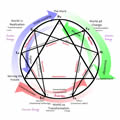Degrees of Reason
2015-02-09
One of our online participants brought in some interesting references to reasoning from Vivekananda which I thought would be well worth sharing. So herewith his post, and my response…
Some thoughts on reason from a Yogic point of view are presented by Vivekananda in Raja Yoga from his Complete Works. His approach was rooted in intellectual rigor, and his complete works include 763 instances of the use of the word reason, but he suggested it was an intermediate state to something higher:
“The Yogi teaches that the mind itself has a higher state of existence, beyond reason, a superconscious state, and when the mind gets to that higher state, then this knowledge, beyond reasoning, comes to man. Metaphysical and transcendental knowledge comes to that man. This state of going beyond reason, transcending ordinary human nature, may sometimes come by chance to a man who does not understand its science; he, as it were, stumbles upon it. When he stumbles upon it, he generally interprets it as coming from outside. So this explains why an inspiration, or transcendental knowledge, may be the same in different countries, but in one country it will seem to come through an angel, and in another through a Deva, and in a third through God. What does it mean? It means that the mind brought the knowledge by its own nature, and that the finding of the knowledge was interpreted according to the belief and education of the person through whom it came. The real fact is that these various men, as it were, stumbled upon this superconscious state.”
“We must take up the study of the superconscious state just as any other science. On reason we must have to lay our foundation, we must follow reason as far as it leads, and when reason fails, reason itself will show us the way to the highest plane. When you hear a man say, "I am inspired," and then talk irrationally, reject it. Why? Because these three states — instinct, reason, and superconsciousness, or the unconscious, conscious, and superconscious states — belong to one and the same mind. There are not three minds in one man, but one state of it develops into the others. Instinct develops into reason, and reason into the transcendental consciousness; therefore, not one of the states contradicts the others. Real inspiration never contradicts reason, but fulfils it. Just as you find the great prophets saying, "I come not to destroy but to fulfil," so inspiration always comes to fulfil reason, and is in harmony with it.”
Along the same lines, the opening stanza of the Tao Te Ching (in the translation in the Buddhist Bible) reads: “The Tao that can be ‘tao-ed’ cannot be the infinite Tao.”
Could it be that “objective reason” cannot be “reasoned”?
Another angle might be that from reason comes understanding, but that there is a paradox in that understanding on a higher level cannot be reduced to the level of reason. That understanding is an emergent state when reason creates the potential for something higher to come in.
To this I responded…
Ahhh... this overworked and underappreciated word, Reason
The word 'reason' appears in Beelzebub's Tales 457 times. Leaving out phrases such as "for some reason or other" there are probably 350 substantial references. So like Vivekananda, Gurdjieff puts a lot of emphasis on reason and reasoning. He also says that there are forms of reason that are only possible after the kesdjan (astral) body is developed.
(BBT page 770) “The second being-Reason, which is named ‘Okiartaaitokhsa,’ can be in the presences of those three-brained beings, in whom their second-being-body-Kesdjan’ is already completely coated and functions independently.
And further...
“The first highest kind of being-Reason is the ‘pure’ or objective Reason which is proper only to the presence of a higher being-body or to the common presences of the bodies themselves of those three-brained beings in whom this higher part has already arisen and perfected itself, and then only when it is the, what is called, ‘center-of-gravityinitiator- of-the-individual-functioning’ of the whole presence of the being.
Of course he also mentions...
the Sacred Anklad, that is, ...that degree of Reason which alone it is in general possible for an independent Individual, whatever his nature, to attain, and which is third in degree after the Absolute Reason of our ENDLESSNESS.
I also found it interesting that like Vivekananda, Gurdjieff indicates that reason comes out of instinct.
(BBT page 88) “You must know that by the time of this second descent of the Most High Commission, there had already gradually been engendered in them—as is proper to three-brained beings—what is called ‘mechanical instinct.’ “The sacred members of this Most High Commission then reasoned that if the said mechanical instinct in these biped threebrained beings of that planet should develop towards the attainment of Objective Reason—as usually occurs everywhere among three-brained beings…
In all likelihood there is an octave of reasoning, and it might make for an interesting exercise to work out what that might mean. In other words, we might find seven quite different examples (levels, stages, experiences, capacities) of reasoning, but we need to see the thread that runs through all of them, right up to the Absolute Reason of our ENDLESSNESS.
That said... I think you are on to something with your formulation,
"Another angle might be that from reason comes understanding, but that there is a paradox in that understanding on a higher level cannot be reduced to the level of reason. That understanding is an emergent state when reason creates the potential for something higher to come in."
At the moment I can't quite "reason it out", but I certainly smell something of real interest in what you said.
- John Hutcherson's blog
- Log in to post comments
